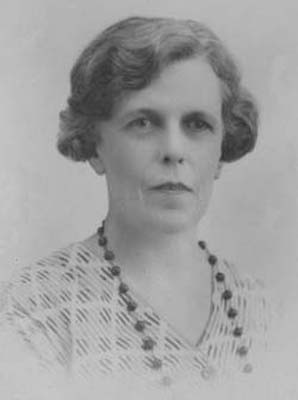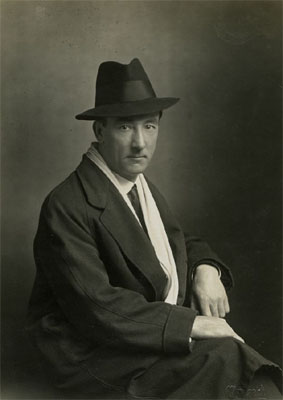White handkerchiefs wave from the short black pier
As we glide to the grand old sea --
But the song of my heart is for none to hear
If one of them waves for me.
A roving, roaming life is mine,
Ever by field or flood --
For not far back in my father's line
Was a dash of the Gipsy blood.
Flax and tussock and fern,
Gum and mulga and sand,
Reef and palm -- but my fancies turn
Ever away from land;
Strange wild cities in ancient state,
Range and river and tree,
Snow and ice. But my star of fate
Is ever across the sea.
A god-like ride on a thundering sea,
When all but the stars are blind --
A desperate race from Eternity
With a gale-and-a-half behind.
A jovial spree in the cabin at night,
A song on the rolling deck,
A lark ashore with the ships in sight,
Till -- a wreck goes down with a wreck.
A smoke and a yarn on the deck by day,
When life is a waking dream,
And care and trouble so far away
That out of your life they seem.
A roving spirit in sympathy,
Who has travelled the whole world o'er --
My heart forgets, in a week at sea,
The trouble of years on shore.
A rolling stone! -- 'tis a saw for slaves --
Philosophy false as old --
Wear out or break 'neath the feet of knaves,
Or rot in your bed of mould!
But I'd rather trust to the darkest skies
And the wildest seas that roar,
Or die, where the stars of Nations rise,
In the stormy clouds of war.
Cleave to your country, home, and friends,
Die in a sordid strife --
You can count your friends on your finger ends
In the critical hours of life.
Sacrifice all for the family's sake,
Bow to their selfish rule!
Slave till your big soft heart they break --
The heart of the family fool.
Domestic quarrels, and family spite,
And your Native Land may be
Controlled by custom, but, come what might,
The rest of the world for me.
I'd sail with money, or sail without! --
If your love be forced from home,
And you dare enough, and your heart be stout,
The world is your own to roam.
I've never a love that can sting my pride,
Nor a friend to prove untrue;
For I leave my love ere the turning tide,
And my friends are all too new.
The curse of the Powers on a peace like ours,
With its greed and its treachery --
A stranger's hand, and a stranger land,
And the rest of the world for me!
But why be bitter? The world is cold
To one with a frozen heart;
New friends are often so like the old,
They seem of the past a part --
As a better part of the past appears,
When enemies, parted long,
Are come together in kinder years,
With their better nature strong.
I had a friend, ere my first ship sailed,
A friend that I never deserved --
For the selfish strain in my blood prevailed
As soon as my turn was served.
And the memory haunts my heart with shame --
Or, rather, the pride that's there;
In different guises, but soul the same,
I meet him everywhere.
I had a chum. When the times were tight
We starved in Australian scrubs;
We froze together in parks at night,
And laughed together in pubs.
And I often hear a laugh like his
From a sense of humour keen,
And catch a glimpse in a passing phiz
Of his broad, good-humoured grin.
And I had a love -- 'twas a love to prize --
But I never went back again . . .
I have seen the light of her kind brown eyes
In many a face since then.
. . . . .
The sailors say 'twill be rough to-night,
As they fasten the hatches down,
The south is black, and the bar is white,
And the drifting smoke is brown.
The gold has gone from the western haze,
The sea-birds circle and swarm --
But we shall have plenty of sunny days,
And little enough of storm.
The hill is hiding the short black pier,
As the last white signal's seen;
The points run in, and the houses veer,
And the great bluff stands between.
So darkness swallows each far white speck
On many a wharf and quay.
The night comes down on a restless deck, --
Grim cliffs -- and -- The Open Sea!
First published in The Bulletin, 31 August 1895;
and later in
In the Days When the World Was Wide and Other Verses by Henry Lawson, 1900;
An Anthology of Australian Verse edited by Bertram Stevens, 1907;
The Golden Treasury of Australian Verse edited by Bertram Stevens, 1909;
The World of Henry Lawson edited by Walter Stone, 1974;
A Treasury of Colonial Poetry, 1982;
A Camp-Fire Yarn: Henry Lawson Complete Works 1885-1900 edited by Leonard Cronin, 1984.
Author reference sites: Austlit, Australian Dictionary of Biography, Australian Poetry Library, The Poetry of Henry Lawson website
See also.
As we glide to the grand old sea --
But the song of my heart is for none to hear
If one of them waves for me.
A roving, roaming life is mine,
Ever by field or flood --
For not far back in my father's line
Was a dash of the Gipsy blood.
Flax and tussock and fern,
Gum and mulga and sand,
Reef and palm -- but my fancies turn
Ever away from land;
Strange wild cities in ancient state,
Range and river and tree,
Snow and ice. But my star of fate
Is ever across the sea.
A god-like ride on a thundering sea,
When all but the stars are blind --
A desperate race from Eternity
With a gale-and-a-half behind.
A jovial spree in the cabin at night,
A song on the rolling deck,
A lark ashore with the ships in sight,
Till -- a wreck goes down with a wreck.
A smoke and a yarn on the deck by day,
When life is a waking dream,
And care and trouble so far away
That out of your life they seem.
A roving spirit in sympathy,
Who has travelled the whole world o'er --
My heart forgets, in a week at sea,
The trouble of years on shore.
A rolling stone! -- 'tis a saw for slaves --
Philosophy false as old --
Wear out or break 'neath the feet of knaves,
Or rot in your bed of mould!
But I'd rather trust to the darkest skies
And the wildest seas that roar,
Or die, where the stars of Nations rise,
In the stormy clouds of war.
Cleave to your country, home, and friends,
Die in a sordid strife --
You can count your friends on your finger ends
In the critical hours of life.
Sacrifice all for the family's sake,
Bow to their selfish rule!
Slave till your big soft heart they break --
The heart of the family fool.
Domestic quarrels, and family spite,
And your Native Land may be
Controlled by custom, but, come what might,
The rest of the world for me.
I'd sail with money, or sail without! --
If your love be forced from home,
And you dare enough, and your heart be stout,
The world is your own to roam.
I've never a love that can sting my pride,
Nor a friend to prove untrue;
For I leave my love ere the turning tide,
And my friends are all too new.
The curse of the Powers on a peace like ours,
With its greed and its treachery --
A stranger's hand, and a stranger land,
And the rest of the world for me!
But why be bitter? The world is cold
To one with a frozen heart;
New friends are often so like the old,
They seem of the past a part --
As a better part of the past appears,
When enemies, parted long,
Are come together in kinder years,
With their better nature strong.
I had a friend, ere my first ship sailed,
A friend that I never deserved --
For the selfish strain in my blood prevailed
As soon as my turn was served.
And the memory haunts my heart with shame --
Or, rather, the pride that's there;
In different guises, but soul the same,
I meet him everywhere.
I had a chum. When the times were tight
We starved in Australian scrubs;
We froze together in parks at night,
And laughed together in pubs.
And I often hear a laugh like his
From a sense of humour keen,
And catch a glimpse in a passing phiz
Of his broad, good-humoured grin.
And I had a love -- 'twas a love to prize --
But I never went back again . . .
I have seen the light of her kind brown eyes
In many a face since then.
. . . . .
The sailors say 'twill be rough to-night,
As they fasten the hatches down,
The south is black, and the bar is white,
And the drifting smoke is brown.
The gold has gone from the western haze,
The sea-birds circle and swarm --
But we shall have plenty of sunny days,
And little enough of storm.
The hill is hiding the short black pier,
As the last white signal's seen;
The points run in, and the houses veer,
And the great bluff stands between.
So darkness swallows each far white speck
On many a wharf and quay.
The night comes down on a restless deck, --
Grim cliffs -- and -- The Open Sea!
First published in The Bulletin, 31 August 1895;
and later in
In the Days When the World Was Wide and Other Verses by Henry Lawson, 1900;
An Anthology of Australian Verse edited by Bertram Stevens, 1907;
The Golden Treasury of Australian Verse edited by Bertram Stevens, 1909;
The World of Henry Lawson edited by Walter Stone, 1974;
A Treasury of Colonial Poetry, 1982;
A Camp-Fire Yarn: Henry Lawson Complete Works 1885-1900 edited by Leonard Cronin, 1984.
Author reference sites: Austlit, Australian Dictionary of Biography, Australian Poetry Library, The Poetry of Henry Lawson website
See also.


